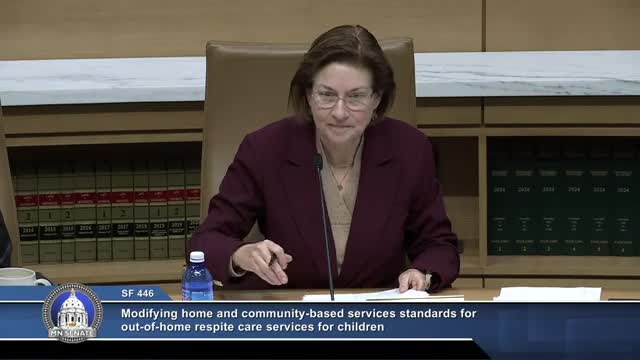Committee backs bill restoring option for out‑of‑home respite in unlicensed homes for waiver recipients
Get AI-powered insights, summaries, and transcripts
Subscribe
Summary
Senate File 446 would allow certain out-of-home respite for children and adults receiving disability waiver services to be provided in unlicensed residential settings under specified safeguards; the committee referred the bill to the Human Services Committee.
Senate File 446, a bill to allow out-of-home respite for children receiving services through the four disability waivers to be provided in unlicensed residential settings under specific safeguards, was recommended to pass and referred to the House-equivalent Human Services Committee by the Senate Health and Human Services Committee on Feb. 18, 2025.
Sponsor Senator Rasmussen said the change would restore a pre-2020 practice that allowed licensed 245D providers to deliver respite in unlicensed settings with case manager and guardian approvals. “The change resulted in the loss of trusted options for families and reduced availability, especially in rural communities,” Rasmussen said.
Sarah Grafstrom, senior director of state and federal policy at ARM (a trade association of residential service providers), described how a 2020 Department of Human Services change limited respite to licensed settings and removed some trusted community options. Grafstrom described proposed safeguards: background studies for everyone in the home, assessment and documentation by the child’s case manager, guardian visitation before the child’s first stay, residential-only settings, a maximum of four children per home, separate bedrooms for each child (except siblings), no mixed-age placements with adults over 21, a 10-consecutive-day limit per stay, and a 46-day annual cap.
Grafstrom said the 46-calendar-day limit was intended to allow recurring short respite stays and occasional longer vacations without effectively converting the placement to a longer-term licensed arrangement. Committee members praised the bill as a targeted change to improve family options and reduce crisis placements that can result from lack of respite.
Senator Abler moved, and the committee approved by voice vote, that SF 446 be recommended to pass and be referred to the Human Services Committee. Committee testimony stressed that the bill would expand safe, community-based respite options for families while retaining background checks and case-manager oversight.
The committee record shows SF 446 was referred to the Human Services Committee for further consideration.
